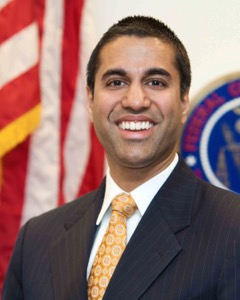Comm. Pai's First Public Speech Hits the Bull's Eye on Innovation

In his first major speech as a member of the Federal Communications Commission (FCC), Ajit Pai on Wednesday proposed the creation of an office for expediting the reviews of new technologies and services. In the speech at Carnegie Mellon University in Pittsburgh, Commissioner Pai, a Republican who joined the FCC in May, accused his agency of moving too slowly and stifling growth in the communications industry.
In the speech at CMU also talked at length about Section 7 of the Communications Act, a section so rarely mentioned at FCC that your blogger was seriously wondering whether it was redacted from all copies of the Act at FCC. While ignored consistently at FCC, Section 7 has been a recurring topic on this blog and there are indications that Comm. Pai’s interest might have been influenced by the discussion here.
Here is Comm. Pai’s discussion of Section 7 in case you are rusty on the details:
Now, you might be wondering: What is Section 7 of the Communications Act? You’re not alone; many communications lawyers don’t know what it is.
Let me quote the important part of Section 7, the neglected stepchild of communications law: “The Commission shall determine whether any new technology or service proposed in a petition or application is in the public interest within one year after such petition or application is filed.”
Looking at that provision, the message from Congress is clear: The Commission should make the deployment of new technologies and new services a . a priority, resolving any concerns about them within a year.
Comm. Pai proposes a new “Office of Entrepreneurial Innovation” for FCC although he suggests that this might be done by transforming the present the Office of Strategic Planning and Policy Analysis.
He states
(I)f we create an Office of Entrepreneurial Innovation, shepherding proposals for new technologies or services through the FCC will become an institutional priority and send the right signals to the marketplace. Entrepreneurs need an advocate at the FCC—one that will hold us accountable if we delay, rather than decide. And if OEI succeeds in its mission, we will see faster innovation, greater investment, and more job creation.
Finally on more general spectrum policy issues, Comm. Pai says
When it comes to spectrum policy, I believe in an “all of the above” approach. Does the FCC need to make available more spectrum bands for wireless broadband? Yes. Do we need to reform the federal government’s management of its spectrum so that more can be made available for private-sector use? Yes. Does the FCC need to expedite its review of secondary market transactions? Yes. Is there a place for geographic spectrum sharing? Yes. Is there a place for unlicensed use? Yes. Do we need to do more to promote the efficient use of spectrum? The answer, again, is yes.
A virtuoso performance! However, many incumbents with good access to 8th Floor decision making probably don’t agree that innovation, other than their own innovation, is a great idea. During its heyday as the dominant mobile radio manufacturer, the old Motorola maintained its market hegemony in Part 90 (private land mobile) market by manipulating FCC rules to keep out innovation that would disrupt their market share out of the marketplace. Indeed, this is the very reason Section 7 was passed in 1983 after Motorola and its allies in the Part 90 user community derailed a new land mobile radio technology (ACSB) from a new entrant!
The speech ended with these impressive words,
Finally, the agenda that I have described today is a work in progress. This speech should be the beginning of a conversation, not the end of one. If you have thoughts on how the FCC can help accelerate economic growth and job creation, tell me. If you have a new idea for how the FCC can become more nimble, promote investment, or allocate additional spectrum for mobile broadband, let me know. Please do not hesitate to contact my office. We have an open-door policy, and we encourage you to take advantage of it. You can even reach out to me on Twitter; my handle is @ajitpaifcc. It doesn’t matter whether you represent a Fortune 500 company, a start-up with three employees, a public interest group, or just yourself. A good idea is a good idea, and I want to hear as many of them as possible.
Although our nation has been going through tough times these last few years, I am confident that our economy will rebound strongly, and that the ICT sector can help lead the way. We see a glimpse of that future here in Pittsburgh. And if we pursue the right policies in Washington, DC, we can remove barriers to investment and innovation and unleash a wave of economic growth and job creation all across the country. Working together, I know we can make it happen. Thank you very much.



![Validate my RSS feed [Valid RSS]](valid-rss-rogers.png)

